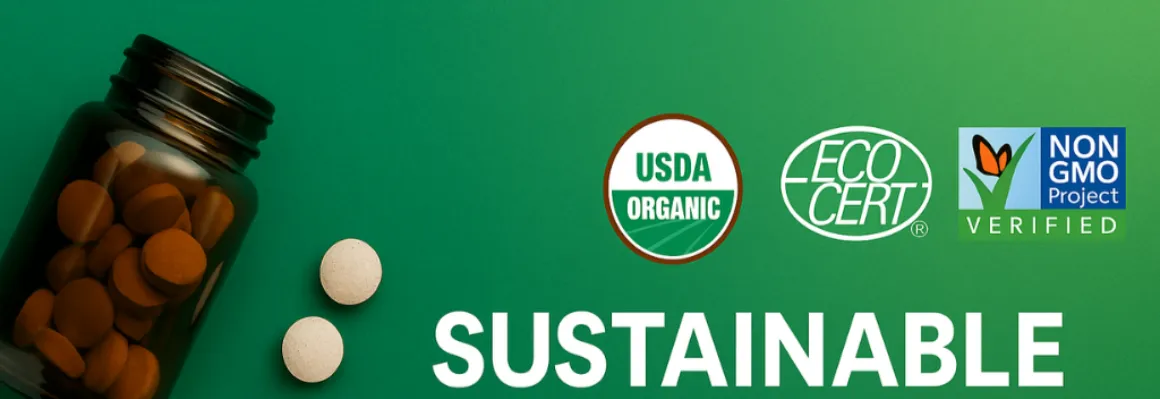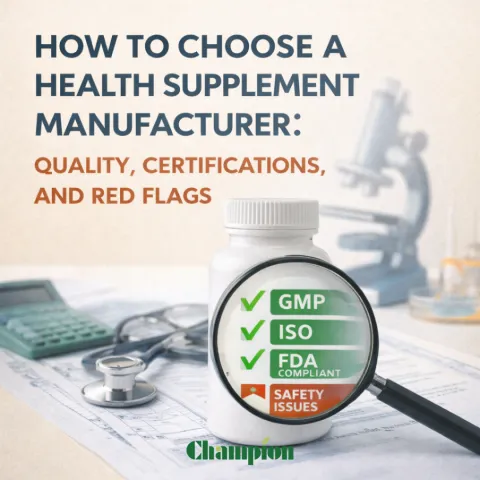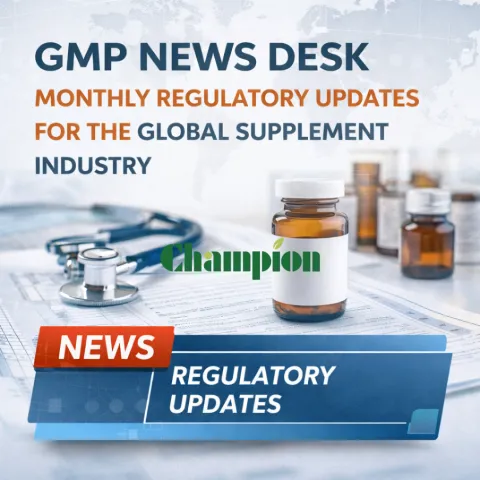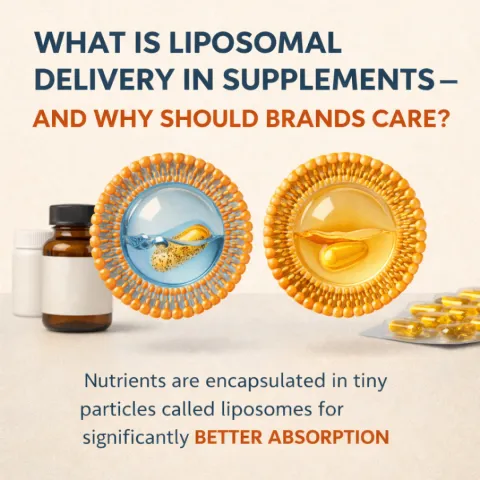Blog
02.Sep.2025
Sustainable Sourcing for Supplements: What Today’s Brands Expect from OEMs

Introduction
Sustainability and transparency are no longer optional in the dietary supplement sector—they are table stakes for success in 2025. Modern brands expect OEM partners not only to deliver quality but to prove that every ingredient is ethically sourced, traceable, and third-party certified. As consumers demand to know the story behind their supplements, ethical and transparent sourcing is the new gold standard. Here’s how Champion Bio and top OEMs are setting the bar in sustainable supplement sourcing.The Sustainability Imperative: Market Trends & Stats
- Global Shift: 82% of supplement consumers in 2025 name sustainability and ingredient transparency as factors influencing their purchase decisions.
- The global supplement industry is projected to hit $327B by 2030, with sustainable brands outpacing the market average in year-on-year growth.
- More than 50% of new supplement launches highlight eco-friendly sourcing, plant-based ingredients, or traceability features in packaging or digital assets.
- Regulatory and retailer standards for environmental and ethical claims are stricter than ever, increasing the importance—and ROI—of verified sourcing and auditing.
What Sustainable Supplement Sourcing Really Means
Sustainable sourcing in supplements is a multifaceted commitment:- Traceability: Providing a clear, auditable record from ingredient origin (farm, fisheries, or lab) to finished product, covering every step of the manufacturing supply chain.
- Third-Party Eco-Certifications: Supplementing claims with certifications such as ECOCERT, UL ECOLOGO, USDA Organic, and Non-GMO Project, which require rigorous audit and compliance across sourcing, energy, packaging, and corporate responsibility.
- Ethical Sourcing: Ensuring suppliers meet labor, environmental, and animal welfare standards—backed by supplier vetting and regular audits.
- Planet-Positive Packaging: Adoption of biobased, recycled, or minimal packaging formats in response to retailer requirements and consumer eco-priorities.
- Full Ingredient Disclosure: Clear, complete labelling—sometimes with QR codes linking directly to ingredient origins, supply chains, and laboratory test results.
Traceability: The New Gold Standard for Quality and Trust
“Traceability of product development is rapidly emerging as a key factor for consumers who want assurance of safety, authenticity, and purity. By providing complete transparency, we empower our consumers to feel confident about their choices.”— Melodie Nahkle, CMO, Nutrilite/Nutrition Brand Leader- Brands like Nutrilite use 9-step traceability, enabling consumers to track products from farm to final package, including scientific and safety checks.
- Over 500,000 ingredient quality checks, DNA testing, and full documentation are becoming best practice for leading brands and their OEM partners.
Leading Eco-Certifications in the Supplement Industry
| Certification | What It Covers | Key Benefit |
| UL ECOLOGO | Multi-attribute life cycle impact | Rigorously tested sustainability |
| ECOCERT | Organic production, input control | Global trust for sustainable sourcing |
| USDA Organic | U.S. organic standards | Preferred in U.S. and EU |
| Non-GMO Project | Non-GMO status, supply review | Clean label credibility |
| CAAE, SKAL, JAS | Regional/organic | Local market compliance |
Stats: By 2025, 42% of new supplements highlight at least one eco- or organic cert on the label, up from 28% in 2020.
What Brands Now Expect From OEMs
- Ingredient vetting: Only source from GMP-certified, eco-audited suppliers.
- Proof of origin: Ability to provide batch-specific ingredient documentation, and evidence of fair labor/environmental practices.
- Flexible transparency: Willingness to share full supply chain details and respond quickly to regulatory or recall audits.
- Eco-design partnership: Packaging and process workflows that reduce waste, carbon footprint, and water/energy consumption.
Industry Interview: “Today’s brands demand full visibility on everything from algae oil farms to adaptogen wildcrafting. Our best OEMs use real-time digital traceability and maintain a portfolio of validated eco- and labor certifications.”— Laura Kim, Regulatory Director, Sustainable Wellness Alliance
Champion Bio Case Study: Putting Sustainability into Practice
- Proprietary Traceability System: All ingredients are tracked from verified origin to final product, available on request and integrated into digital labels.
- Supplier Audit Program: Annual reviews of every supplier, with on-site and third-party inspections for eco and labor standards.
- Eco Packaging: 80% of new launches use recycled or compostable packaging, with targets for 100% by 2027.
- Collaborative Innovation: Champion Bio partners with clients to achieve region- or retailer-specific certifications, making speed-to-market with sustainable claims possible.
How Sustainable Sourcing Drives ROI
- Brand Loyalty: 75% of wellness consumers report higher loyalty to brands with strong sustainability and traceability commitments.
- Market Access: Major retailers now require proof of environmental and social compliance for shelf placement and premium listings.
- Risk Mitigation: Traceability enables rapid response to recalls and global scrutiny, protecting brands against regulatory and reputational risk.
FAQs: Sustainable Supplement Sourcing
Q: What are the most in-demand sustainable supplement ingredients in 2025?A: Algae-derived omega-3, plant adaptogens, upcycled botanicals, organic supergreens, and traceable probiotics.
Q: What documentation should my OEM provide?
A: Batch-level origin certificates, supplier audit reports, certifications (ECOCERT, USDA, Non-GMO), and full chain-of-custody details.
Q: Do consumers actually care about ingredient traceability?
A: Yes, and it’s rising—especially for younger demographics and in EU/US/APAC urban markets.
Conclusion
Sustainable supplement sourcing is no longer a niche differentiator—it’s the foundation of trust and growth in 2025 and beyond. Brands and OEMs that deliver full traceability, eco-certification, and open ingredient disclosure will win market share, premium placement, and lasting consumer loyalty.Looking for an ethical partner?
Champion Bio’s industry-leading traceability systems and sustainable sourcing expertise set a new global standard. Contact us to build your next supplement on a foundation of trust, transparency, and positive impact.



















